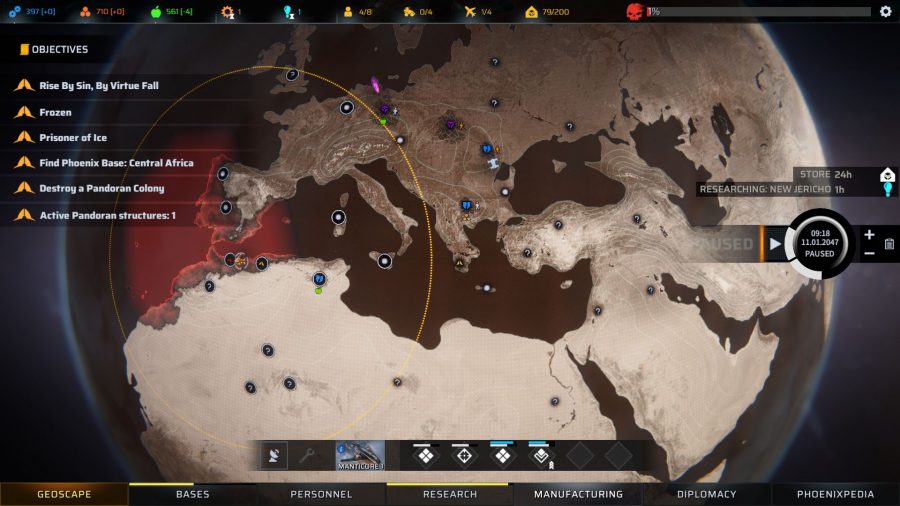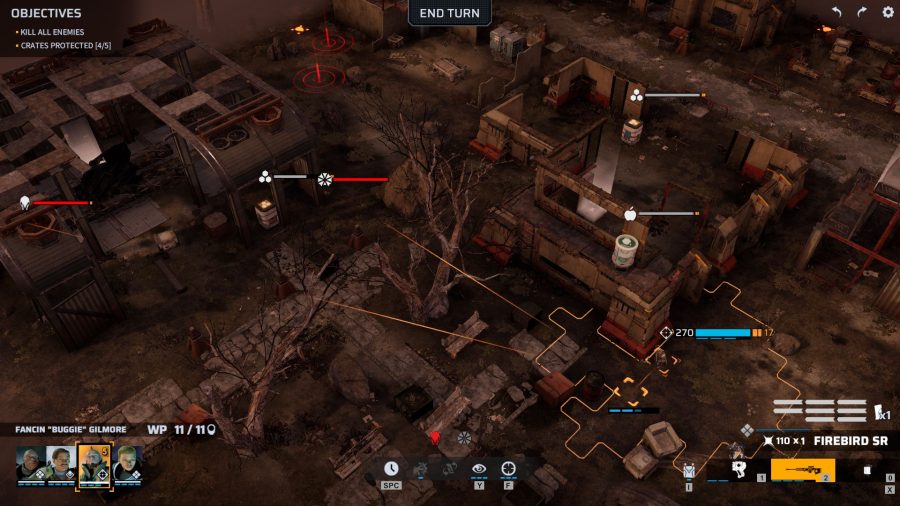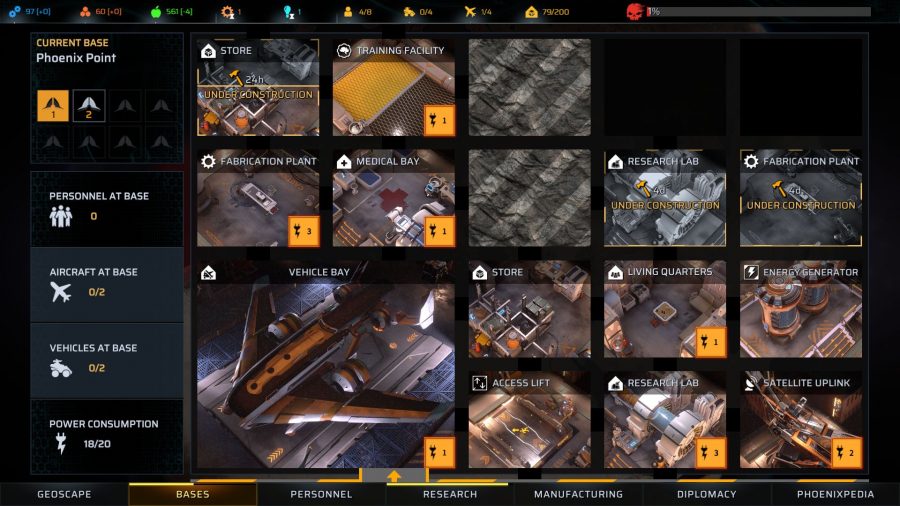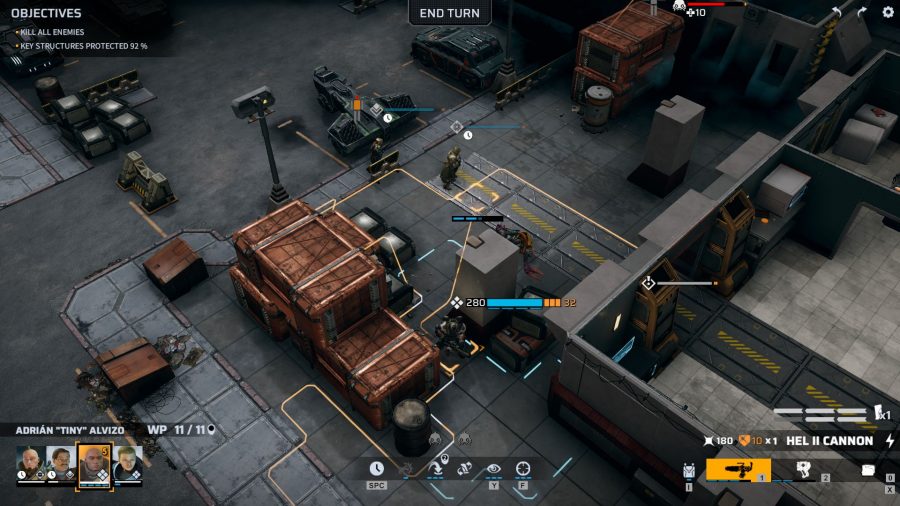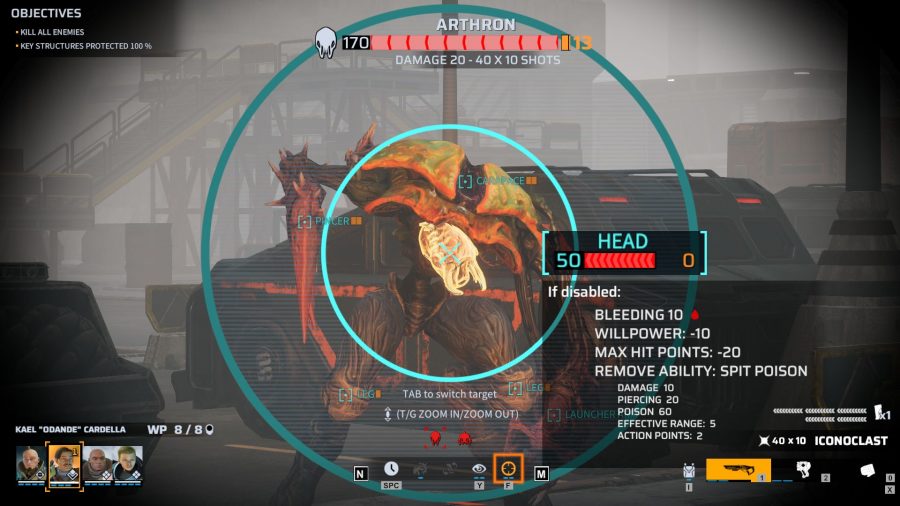Our Verdict
May not meet the legacy of its celebrated forebear X-Com, but then few games ever will. Elegant, atmospheric, and energetic, Gollop’s latest remains remarkably hard to put down.
Innovative game design in the turn-based tactics genre is a tricky business. Players and publishers alike yearn for fresh ideas and experiences, because that’s what we’ve always done. New things beguile us.
But that desire for originality needs to be offset with a respect for the conventions of the form. Turn-based strategy games are necessarily constrained by their own design rulebook, and their fans expect certain things to work in certain ways. It only takes a little innovation to rip a game straight out of the genre. As such, studios must carefully balance innovation and expectation.
For Snapshot Games, the studio behind Phoenix Point, there’s a further constraint in that it must stick closely to everything X-Com: UFO Defence was, without simply producing a clone. This is a game, after all, that self-describes as a ‘spiritual successor’ to its own creator’s influential 1994 tour de force.
That considered, you can see why famed designer Julian Gollop and his peers at Snapshot have taken their time, delaying the release by close to a year. Even framing Phoenix Point as a close cousin of a heavyweight like the original X-Com piles on anticipation that comes with contrary expectations; expectation about how it should be, and expectation that it will do influential new things.

And sure enough, you can feel the X-Com running through Phoenix Point’s veins. Phoenix Point, like X-Com, is played at two overarching levels; down on the battlefield, and at a global scale through the ‘Geoscape’ interface. The latter is where you explore Earth and manage resources before dipping down into battle. Equally, the broad establishing set-up of Gollop’s latest effort takes the lead from UFO Defence. Phoenix Point is, after all, a game about repelling an extraterrestrial force. Lest we forget, ‘X-Com’ is short for ‘Extraterrestrial Combat’.
Here, however, Earth has been devastated by an alien virus that has mutated animals and humans, leaving very few survivors, many of who have gathered in ‘Havens’. Those Havens serve as communities and outposts where different human factions are struggling to survive – and fighting for their place in the post-apocalyptic pecking order. The ‘Phoenix Project’ is the spear tip of an organised effort to repel the alien menace, with a mysterious past that hints that all is not what it seems.
Phoenix Point itself is the headquarters of that initiative, and home to a clique of scientists, engineers, construction experts, and military staff. Yours is the task of investigating and pushing back the otherworldly threat, while managing relationships with the various factions and gangs that each have different ideas about what kind of life to rebuild after a global cataclysm.
There’s something else of X-Com that feels near-tangible while playing through Phoenix Point. Gollop’s lifelong obsession with board games is so evident in his latest creation it almost feels like it could have been prototyped in cardboard. The language of Phoenix Point’s systems and the momentum of its gameplay will feel very familiar to anybody who has spent time playing out tactical combat in the tabletop realm. There’s a little of classics like Space Hulk in Phoenix Point, as well as a flavour of quick-playing miniatures wargaming titles such as the superb Memoir ’44. Even more so, Gollop’s latest is comparable to newer tactical combat board games like Star Wars: Imperial Assault in terms of how it feels to play.
That’s no surprise. Gollop gravitated to early computers as a youngster because he saw them as a vehicle through which to deliver the ideas he had for board games. Clearly, he’s still driving that vehicle, with a deft hand on the steering wheel. Yet Phoenix Point does bring something a little unwelcome from the realm of complex board games, though it’s only fleetingly troublesome. The tutorial exists as a pretty dense rulebook from the off, and for a brief period the walls of text that come at you feel like they are boxing you in with incomprehensible detail. Then, just as it feels like there is too much to take in, it all suddenly comes together.
There’s a hell of a lot of nuance to the mechanisms of Phoenix Point’s gameplay machinery, but collectively it is a brilliantly elegant entity. The depth, freedom of decision making, complexity, and variety on offer in both the tactical combat and strategy metagame are significant, but Phoenix Point rarely feels overwhelming. It plays with light and energetic heart, even though there is a tremendous amount going on.
Most of the gameplay time is spent in combat down on Earth’s surface in turn-based combat, expending energy and resources on moving through areas while fending off notably dynamic enemies. Phoenix Point’s mutated creatures will quickly feel familiar, but that doesn’t mean they behave uniformly on the battlefield. Even the lowliest grunts can surprise you, as you tackle missions that often ask you to do more than just eradicate all enemy forces. Snapshot has concocted a decent spread of mission types, from sabotage and assassination missions to those that see you leap in to defend an inundated Haven, or secure key intelligence.
The action is, of course, turn-based, but there’s a considerable snappiness to proceedings. By definition the game is played in stops and starts, yet Snapshot has imported a faint sense of the flow of action point-and-click strategic shooters. Phoenix Point plays briskly and tense, with every interaction feeling significant. That’s as true when you’re rushing a mission as when methodically scouring a new area.
Indeed many of the combat operations actually start as exploratory missions, seeing you drop down into unknown locations to find out just what might be down there, and how it might influence the overarching narrative, or offer provisions and technologies that change the balance of power in combat and between factions.
Exploring the unknown is really what Phoenix Point is about, from the mystery surrounding Phoenix Project and the extraterrestrial hazard to the haunted remains of the planet itself. At the start of the game, the state of the entire world is largely hidden. There are other Phoenix Project bases out there to find and secure, Havens to build relationships with, and numerous sites to plunder for information and resources. But the way forward is far from explicit.
The core loop of the gameplay sees you supply troops, manufacture resources, prioritise your manufacturing projects against your capacity, research new abilities and information, and scan the globe for more locations and threats, before picking a location to explore – which inevitably leads to gunplay. With the last shots fired, it’s back to the Geoscape again.
Gollop and his team have leaned heavily on procedural generation for Phoenix Point. It’s clearly been carefully scripted to ensure story beats fall appropriately, much like Firaxis’s modern XCOM games, but the idea is that every new playthrough will bring a unique experience, with locations appearing in variable points on the map, faction relationships starting out differently, and battlefields sporting fresh environmental detail each time. It’s well thought-out and generates some brilliant details. For example, depending on where a setting appears on the map in each playthrough, it will sport a variable tone and style dictated by its location.
This approach complements a game that strives to be non-linear. You simply won’t have the capacity to rush to every rescue mission or mystery that appears on the map, forcing tough decisions about the next best step. And with increasing frequency the way a battle plays out will shift your objectives in real-time, perhaps seeing an offensive drive become a defensive stand-off.
The idea is that Phoenix Point feels like a living, dynamic entity. It very often achieves that, but over time a playthrough can start to feel a little flabby and lacking in focus. However guided proc-gen is, there is always a risk that it means the designers of a game relinquish a little directorial control. It’s far from seriously problematic here – rather, there is just a vague sense of looseness of direction to as you delve deeper into what remains a marvellously captivating game. That’s not to say there is a need for true linearity as the many threads of the plot consolidate. It’s just that more assertive creator’s hand might more precisely deliver major narrative beats, and better build tension.
One of Phoenix Point’s key differentiators from Firaxis’s XCOM is that you can freely aim shots in battle now, rather than have a percentage chance of hitting a given target. This can sometimes feel a little unwieldy and overly complex. When free aim should be about giving the player more control in combat, there seem to be so many external factors that can influence where a shot lands that it’s hard to feel that where you point your weapon really matters that much.
It is worth noting that – while there are occasional voice acting wobbles – the music and audio effects are wonderfully rich and atmospheric, and do a great job of conjuring the ambience and dynamism underway at any point in Phoenix Point. Snapshot has also created a pretty game that teems with detail, and is still stylish on lower settings.
All said and done, Phoenix Point is an engrossing and energetic turn-based tactical combat and management sim game. It turns out to be at its strongest when it is conventional, which is often. Many of its efforts to be distinguish itself among a widely imitated genre do land with grace, but occasionally serve to make the gameplay and tone lose a little focus.
Certainly, if you’re genre devotee, a fan of Gollop’s back catalogue, or just want to see your board gaming tastes represented in digital form, Phoenix Point is well worth considering. Its many strengths outweigh a scattering of rather abstract weaknesses, and those shortcomings only warrant scrutiny because of its tremendous legacy. Because if you call your project a ‘spiritual successor to X-Com’, you inevitably face comparison to not just a genre great, but one of the most celebrated games there is.

